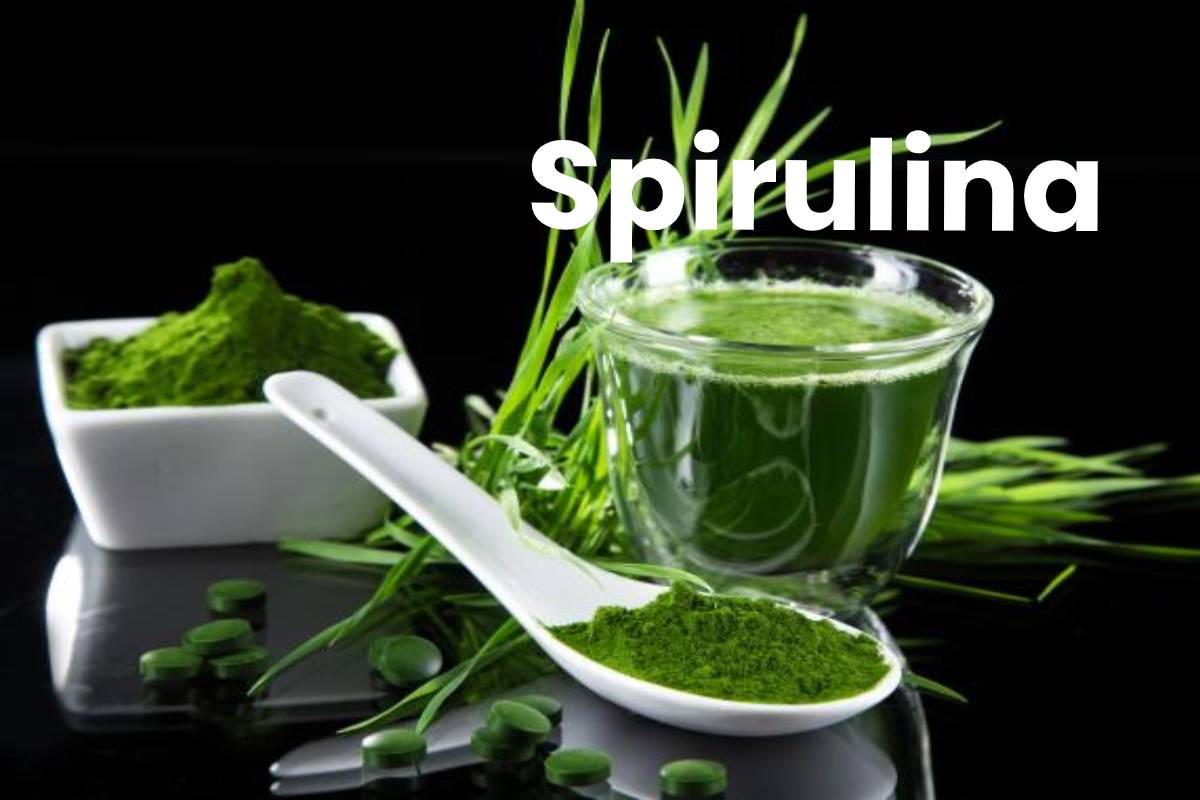Table of Contents
Spirulina Definition
Spirulina has become popular as a type of algae, but the truth is that it comes from a kind of cyanobacteria known as “blue algae. ”
Its consumption has not become popular until recently in modern societies, mainly in tablets or capsules, as a nutritional supplement.
This food already uses in Mesoamerican cultures such as the Aztecs, regions near Lake Chad in Africa, where this product is abundant.
Its powder form is also popular, which can easily include in juices and smoothies.
What are the Properties of Spirulina?
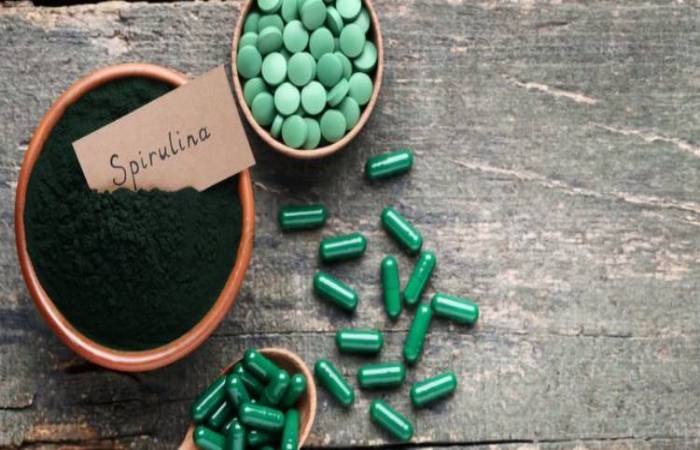
This microalga gives the body an essential supply of vitamins and minerals, although it can also have adverse effects.
According to the Group of supplements of the Food Council of the COF of Barcelona, spirulina stands out for the following properties:
Proteins: it has a higher proportion of proteins than other sources, providing 65 percent of these to the body.
Easy Digestion: Spirulina is devoid of cellulose, making it easier to digest, even for people with low intestinal absorption.
Lipids: Essential fatty acids occupy an essential proportion in the composition of spirulina.
Minerals: spirulina has significant potassium, magnesium, calcium, zinc, manganese, selenium, iron, and phosphorus.
Vitamins: It contains many vitamins such as vitamin E and other elements like antioxidant properties, beta-carotene, and all the vitamins of group B.
However, the vitamin B12 it provides is not bioavailable for humans, so it does not replace the supplementation that vegans and vegetarians require.
Pigments: it has stains in high quantities that could have antioxidant and anti-inflammatory effects.
What are the Benefits of Spirulina?
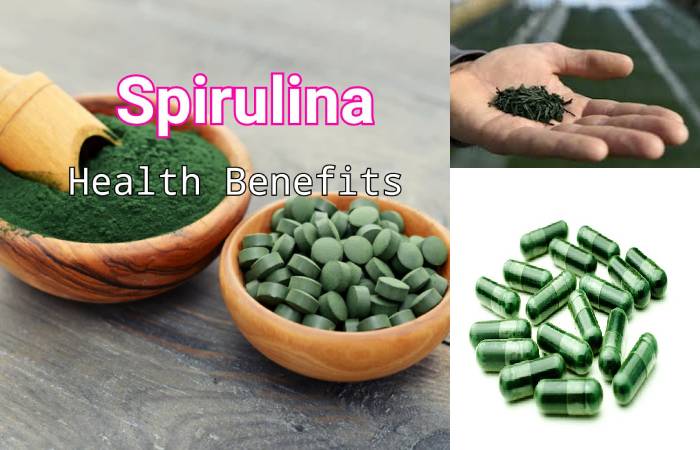
Spirulina is a food with many nutritional contributions and health benefits, being an ideal product to use as a supplement. We tell you about them below.
1. Contains all kinds of Nutrients
- Spirulina contains a large dose of all kinds of nutrients.
- It is very rich in protein (4 grams for every 7 grams of product), vitamins B1, B2, B3, iron, magnesium, potassium, omega 3, and omega 6.
- It contains small amounts of almost all the necessary nutrients for our body.
- Also, these are absorbed more quickly than those of other types of food.
2. Regulates Bad Cholesterol
- It helps reduce bad cholesterol and triglycerides while helping to increase the presence of good cholesterol.
- It makes an ideal food to prevent related diseases, such as heart attacks,
3. Antioxidant
- Spirulina is also a great source of antioxidants, such as chlorophyll or carotenoids. Another of its antioxidants is phycocyanin.
- It helps fight free radicals and eliminate dangerous cells, which helps prevent certain types of cancer.
- This substance is what provides the bluish-green color of this alga.
4. Anti-Inflammatory
- Phycocyanin also provides spirulina with its natural anti-inflammatory effects, reducing inflamed tissues’ damage.
5. Rich in Iron
- Spirulina is one of the foods richest in iron, one of the reasons the WHO highly recommends it.
- The type of iron it presents, being of organic vegetable origin, is easy for the body to absorb.
6. Reduces Blood Pressure and Sugar Levels
- Spirulina is also rich in nitric oxide, promoting relaxation and dilation of blood vessels, promoting circulation, and reducing blood pressure.
- The same happens with the body’s sugar levels, being beneficial as a supplement in diabetes cases.
7. Strengthens Defenses
- The main antioxidant component present in spirulina helps increase T lymphocytes’ level in the body, an essential part of the immune system.
- These lymphocytes help protect us from cellular abnormalities that can cause infections or diseases like cancer, so they play an essential part in fighting it.
8. Improves Muscular Endurance
- This type of blue-green algae’s antioxidant properties helps minimize muscle damage due to oxidative damage after intense exercise.
- Spirulina helps improve muscle endurance and even muscle strength.
9. Improves Allergies
- Thanks to its anti-inflammatory properties, this superfood is also beneficial for treating allergic rhinitis symptoms or any other allergy.
- It characterizes by inflammation of the nasal passages.
10. Helps to Lose Weight
- Another benefit that has made spirulina popular is its effect on weight loss diets.
- This food contains a type of amino acid, phenylalanine, which has a satiating effect and helps reduce appetite.
- That is why it can be a good ally when it comes to losing weight. Also, it contains many nutrients in a few calories, which makes it an ideal supplement.
How to Take Spirulina?
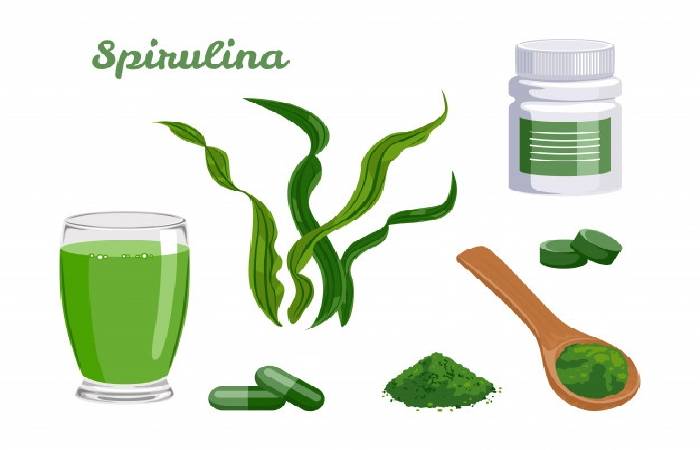
- Spirulina is marketed mainly in capsule, tablet, or powder format, although you can also find fresh spirulina or included in other types of foods.
- It can consume in pills or capsules as a nutritional supplement and as directed on the package. If consumed in powder form, it can be mixed with water alone or served in smoothies and preparations.
- It recommends starting consuming 1 to 3 grams a day and increasing the daily dose once it verifies that the body’s reaction is good since not everyone tolerates it in the same way. If you notice adverse side effects, stop using it immediately.
- If you want to take this food as an aid to lose weight, it recommends to take it before meals, so that you can benefit from its satiating effect.
Contraindications of Spirulina
- Despite being the food of plant origin, it should consume with caution with excellent nutritional and beneficial health properties.
- It is necessary to ensure a reliable origin and good quality since crops do not pass any control and may present contamination.
- Taking this type of contaminated seaweed could lead to stomach pain, nausea, vomiting, or even liver damage.
- It contraindicates in case of kidney problems or hyperthyroidism.
- In cases of other diseases, it recommends consulting health professionals before starting their consumption in pregnancy or during lactation.
Precautions of Spirulina
- People listed in the following points should avoid consuming spirulina:
- Those take medications that may increase the risk of bleeding.
- People who suffer from hyperuricemia, hyperthyroidism, phenylketonuria, liver diseases, and autoimmune pathologies.
What are the Side Effects of Spirulina?
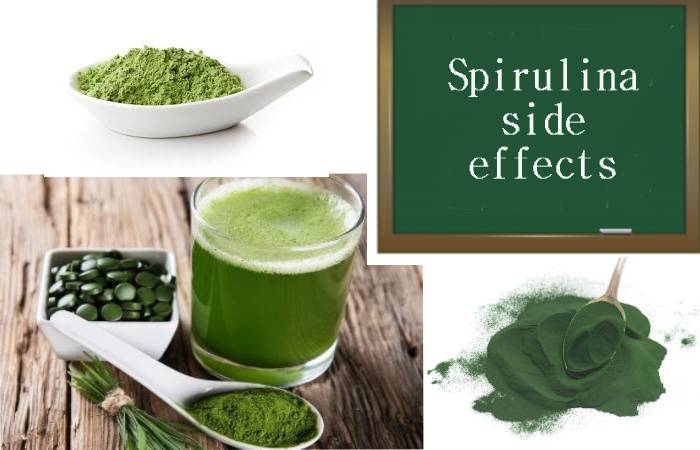
- Spirulina is a food and not medicine. Its consumption is safe in the appropriate doses, and serious adverse effects not describe.
- It may be side effects, such as skin rash, thirst, constipation.
- Also, the consumption of spirulina can interact with medications, altering their effectiveness.
- Those who will take this alga and take any medication to advise to consult their doctor or pharmacist beforehand.

